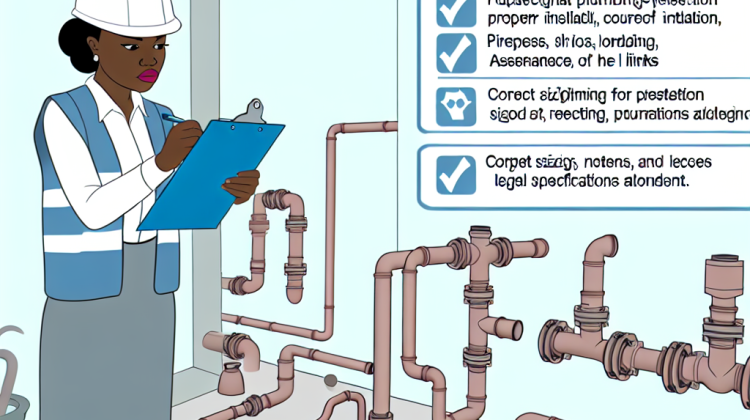
Did you know that passing a rough plumbing inspection can save you a whole lot of money? It’s true! When you’re building or renovating, getting the right plumbing in can really make or break your project. Inspectors check to make sure everything’s up to code, so you don’t end up with leaks or floods later. Rough plumbing includes laying down pipes, drains, and vents before the walls go up, and it’s super important to nail it on the first try.
Years ago, people usually just trusted their plumber’s word, but things have changed quite a bit. Nowadays, you have to show exactly how the plumbing will work before you cover it all up. The codes are stricter, and they exist to keep everyone safe and to make sure the water stays where it should. If your plumbing doesn’t pass inspection, you might have to rip out walls or floors, and that can be a real pain—both for your wallet and your schedule.
A handy tip to remember is to double-check your work before the inspector arrives. Did you know that about 70% of failed inspections are due to simple mistakes? Just think about that! If you measure twice and cut once, you could be among the lucky ones who breeze through the inspection without a hitch. Make sure all your pipes are properly secured and that there are no leaks. Plus, having all your paperwork in order can be a total lifesaver. If you’re ready with your plans and permits, you’ll look pretty solid in front of the inspector.
It’s also helpful to get some advice from your plumber or someone who’s been through the process before. No one wants to look clueless when the inspector shows up. Listen to the pros; they’ve probably seen it all and can offer tips. When it comes to making sure your connections are tight and all your vents are in the right place, experience counts. Sometimes, just knowing a few basic rules can be the secret sauce to passing your inspection with flying colors.
And hey, keep in mind that it’s not just about passing the inspection. It’s about making sure you have a system that works well too! You don’t want to deal with problems down the line. If you take your time and put in the effort to get things right now, your shiny new bathroom or kitchen will thank you later. Just imagine how nice it’ll be to turn on that faucet and have everything run smoothly!
How to Pass Rough Plumbing Inspection
When it comes to passing a rough plumbing inspection, being prepared is the name of the game. You don’t want to get caught off guard, so let’s dive right into what you need to do to ace this challenge.
Know the Codes
First off, it’s super important to know the plumbing codes for your area. Every city and state has different rules, so be sure to check those out. It might seem like a hassle, but getting familiar with these codes can save you a lot of time and headaches later on.
Check Your Work
Now, before the inspector arrives, do a thorough check of your plumbing work. Make sure everything’s nice and tight. Look for any leaks, and fix them before the inspector gets there. Nobody likes a surprise leak—especially not your inspector!
Use Quality Materials
Also, remember to use good quality materials. If you skimp on pipes or fittings, that can come back to bite you. Invest in sturdy materials that meet the required standards. It ain’t worth it to cut corners!
Pipe Placement Matters
Correct pipe placement is essential. Pipes should be properly positioned and have enough slope—especially for drain pipes. A good rule of thumb is to angle them slightly downhill so water flows smoothly. Nobody wants a clog, right?
Ventilation is Key
Don’t forget about ventilation! Make sure there’s enough venting for your system. Proper ventilation helps prevent sewer gases from entering your home. You wouldn’t want that stinky situation, believe me!
Mind the Clean-Outs
Also, be sure you’ve got clean-out access points. These little guys help clear clogs later down the line. They should be accessible and easy to reach. Imagine trying to find a needle in a haystack; not fun, right?
Install Support Properly
Supporting your pipes is another must. Make sure all pipes are anchored correctly. This prevents sagging or damage over time. Use straps or hangers to keep things steady and secure. It’s like giving your pipes a cozy hug!
Have Your Tools Ready
When the inspection day comes around, have all your tools ready. If the inspector asks for something, you wanna be prepared. Remember, being organized shows you mean business!
Be Ready for Questions
Your inspector might have questions about your setup. Don’t sweat it—just be honest! If you’re unsure about something, admit it. They’d rather have you ask questions than fake it. After all, nobody knows everything.
Clean Up the Job Site
Lastly, clean up your work area. A messy site can raise flags. Keep things tidy and organized, and it gives a good impression right off the bat. Plus, it makes it easier for the inspector to do their job. Double win!
When you check all these boxes, you’ll have a much better chance of passing that rough plumbing inspection with flying colors. And remember, about 80% of plumbing failures happen due to poor installation. So, take your time and do it right!
“`html
How to Pass Rough Plumbing Inspection FAQ
What is a rough plumbing inspection?
A rough plumbing inspection is when a plumbing inspector comes to check the pipes and systems before the walls are closed up. They make sure everything is safe and working right!
Why do I need to pass the inspection?
Passing the inspection is important because it helps ensure your plumbing will work well and not cause problems later. It also keeps you and your family safe from leaks and other issues.
What should I do before the inspection?
Before the inspection, make sure all your pipes are connected tightly, and there are no leaks. You can also double-check your plans to be sure everything matches what the inspector expects!
How do I fix leaks?
Fixing leaks can be as simple as tightening a loose connection, but if it’s a bigger problem, you might need to use plumber’s tape or replace a section of the pipe. Just be careful, and if you’re not sure, ask a professional!
What happens if I fail the inspection?
If you fail the inspection, the inspector will tell you what needs to be fixed. You’ll have to make those changes and ask for a re-inspection later to get the all-clear.
Do I need to be home during the inspection?
It’s not always necessary to be home, but it can help! If you’re there, you can answer questions and show the inspector what they need to see. Plus, it can feel less stressful when you’re around.
What common mistakes do people make?
Common mistakes include not securing pipes properly or forgetting to support them. Some folks also might skip the test for leaks, which isn’t a good idea!
Can I do the plumbing work myself?
Yes, you can do the plumbing work yourself, but make sure you know what you’re doing! If you’re unsure, it’s always best to ask someone who has more experience.
How long does the inspection take?
The inspection usually takes about 30 minutes to an hour. It depends on how much plumbing you have and any issues the inspector finds!
Will the inspector tell me what to fix?
Yes, the inspector will give you a list of things to fix if there are issues. They’re there to help you make sure everything is safe and up to code!
“`
Wrapping It All Up: Tips to Ace Your Rough Plumbing Inspection
To sail through your rough plumbing inspection, it’s super important to make sure everything’s in tip-top shape before the big day. First, check all your pipes and fittings. Make sure there are no leaks or loose connections. Tighten up those valves and joints, so they’re tighter than a drum! Next, double-check that you’ve followed all local codes and regulations. This means knowing what’s allowed and what’s not in your area—trust me, it’ll save you a headache later.
Don’t forget about the cleanliness factor either. A neat and tidy workspace shows you mean business and that you care about your work. Also, keep a list of the materials you used, just in case your inspector has questions. Lastly, if you can, have a buddy or a mentor look things over before the inspection. Two heads are better than one, right? When the inspector arrives, be friendly and ready to answer any questions. That way, you’ll not only pass but might even impress them! With these tips in your back pocket, you’re all set to make that inspection a breeze!
